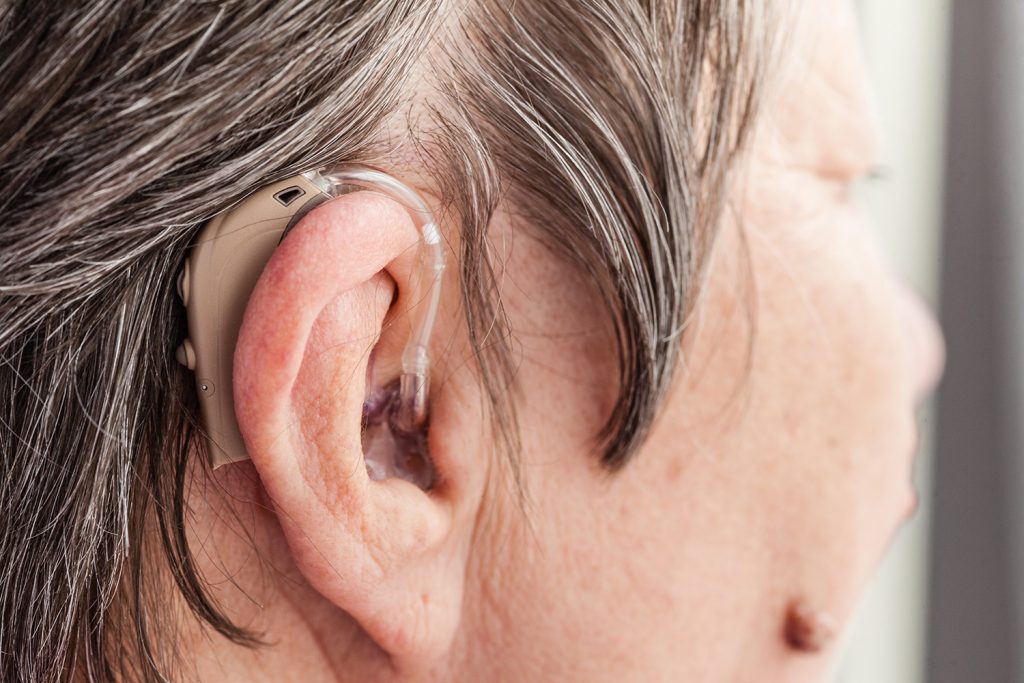Hearing loss is more common than most people realize. As we age, we lose some of our hearing. But, did you know that there are different types of hearing loss?
The 3 Main Types of Hearing Loss
- Sensorineural hearing loss
- Conductive hearing loss
- Mixed hearing loss
The type of hearing loss depends on what or where the damage is in the ear. The causes, symptoms, and treatment for each type also vary.
To help you better understand the type of hearing loss you possibly have, let’s take a closer look at the basic types of hearing loss and the steps you need to take based on your category.
Sensorineural Hearing Loss

The most common type of hearing loss is called sensorineural hearing loss. This is a permanent hearing loss that happens when some important parts of the inner ear experienced damage.
Typically, it is caused by damage to either the hair cells of the inner ear of the auditory nerve itself. Either of which affects the transfer of nerve signals to the brain. When the nerve signals are blocked, the brain receives inaccurate loudness and clarity of sounds.
Symptoms
One of the most common complaints of people suffering from sensorineural hearing loss is that they can hear talking, just not clearly. The typical symptoms of this type of hearing loss affect both the loudness and the clarity of sounds.
These are the symptoms of sensorineural hearing loss:
- Difficulty to understand two people talking at the same time.
- Noises become too loud or too quiet
- Having trouble listening in places where there’s a great deal of noise. These places include nightclubs, train stations, construction sites, sports stadiums, etc.)
- Difficulty hearing and understanding high pitch sounds of women or children’s voices.
- Hearing mumbling instead of speech from other people
- Tinnitus – or a constant ringing in the ears
- Feeling off-balance or dizzy at times
Causes
In children, sensorineural hearing loss is mostly due to a genetic syndrome or infection. A pregnant mother who has toxoplasmosis, rubella or herpes may pass the infection to her fetus. When the infection is passed down to the developing fetus, the baby is at risk of hearing impairment, among other health risks.
However, sensorineural hearing loss in adults is different. It can be caused by a variety of factors, including:
- Health deterioration due to old age (also known as presbycusis)
- Auto-immune diseases
- Blood vessel diseases
- Meningitis, mumps, scarlet fever, measles, and other viral infections
- Traumatic injuries
- Constant exposure to loud noises and sounds at work
- Ototoxic medications
- Meniere’s disease
- Cancerous growths in the inner ear (also known as acoustic neuroma)
Treatment
When the tiny hair-like cells of the inner ear are damaged, it’s irreversible. There is no medical cure or surgical procedure that can restore the hair-like cells.
However, cochlear implants or hearing aids can help restore some level or hearing. As to how much hearing can be restored, it still depends on the severity of the case.
For a complete hearing loss solution, hearing aids and patients with cochlear implants are recommended to use assistive listening devices and alerting devices like vibrating alarm clocks and captioned phones.
Conductive Hearing Loss

Conductive hearing loss happens when the Outer or Middle Ear developed an abnormality or experienced trauma. Obstruction or damage to these parts of the ear interferes with the passing sound.
Symptoms
Conductive hearing loss occurs when the inner ear is blocked, but the delicate inner ear and auditory nerve remains intact, hearing difficulty occurs mostly with volume, but not clarity. People who suffer from conductive hearing loss may find themselves frequently turning the TV volume up or the radio to improve their ability to hear.
Here are the other common signs of conductive hearing loss in adults:
- The ability to hear better out of one ear than the other
- Feeling of fullness or pressure in one or both ears
- Trouble hearing and comprehending telephone conversation s
- Feeling of pain in one or both ears
- A foul odor emanating from the ear canal
Causes
The main causes of conductive hearing loss include:
- Otosclerosis, or abnormal bone growth in the middle ear
- Earwax buildup
- Punctured eardrum
- Otitis media, or fluid build-up in the middle ear
- Ear infections
- Abnormal growths in the middle ear (e.g. cholesteatoma, glomus tumors)
- Obstructions caused by foreign objects
Treatment
Hearing technologies and surgery are two of the most common ways to treat conductive hearing loss. These may not restore 100% hearing but they can definitely improve the quality of hearing.
Below are the popular treatments for this type of hearing impairment:
- Surgery – If your conductive hearing loss is congenital by nature (e.g. congenital absence of ear canal, failure of the ear canal to be open at birth, congenital absence, malformation, head trauma), or caused by otosclerosis, surgery may correct it.
- Hearing aids – Wearable devices like a hearing aid can amplify sounds to help a patient hear more accurately. Different types of hearing aids include bone-conduction hearing aid, surgically implanted hearing aid, osseointegrated device, and a conventional hearing.
- Antibiotic. Chronic ear infections can be trated using antibiotics or antifungal medications.
Mixed Hearing Loss

Basically, mixed hearing loss is any combination of sensorineural and conductive hearing loss. It is characterized by permanent hearing loss, while the conductive component can either be a temporary or permanent state. A good example would be a person suffering from Presbycusis who also has an Ear Infection.
Symptoms
As mentioned, a person with a mixed hearing loss both display symptoms of conducting and sensorineural hearing loss. If you believe you have a combination of those listed above from both types, there’s a big chance that you have mixed hearing loss.
Causes
Trauma to the ear often causes mixed hearing loss. It can also happen gradually when one hearing loss develops over an existing one. For example, a person with sensorineural hearing loss may experience a temporary mixed hearing loss because of wax buildup.
Next Steps
Hearing loss affects over 466 million people worldwide. If you believe you are showing symptoms of hearing loss, regardless of the type, consult an audiologist right away. Most hearing loss can be managed with a hearing aid device.




